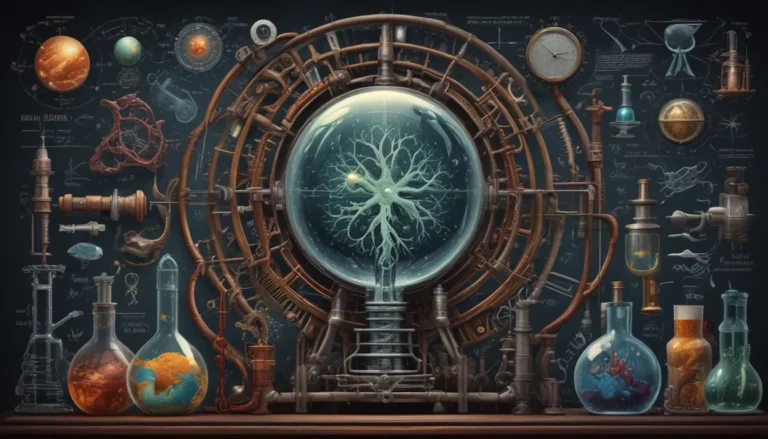A Note About Images: The images used in our articles are for illustration purposes only and may not exactly match the content. They are meant to engage readers, but the text should be relied upon for accurate information.
Have you ever stopped to think about the role that combustion plays in shaping our daily lives? From the warmth of a crackling fire to the powerful engines of rockets, combustion is a phenomenon that has fascinated humanity for centuries. In this article, we will delve into 19 fascinating facts about combustion, exploring its scientific principles, practical applications, and environmental impact. Whether you are a science enthusiast, a curious student, or simply interested in expanding your knowledge, these facts will provide valuable insights into the world of combustion. So, join us on a journey through the fiery realm of combustion as we uncover its mysteries and discover how it influences our world in diverse ways.
Understanding the Essence of Combustion
- Combustion Powers Our Daily Lives: Combustion is the driving force behind many essential aspects of our lives, including powering vehicles, cooking food, and generating energy. It is a captivating process with historical significance and ongoing research for cleaner, more sustainable practices.
- Exploring the Science of Combustion: By understanding combustion, we can develop effective fire safety strategies and explore cleaner energy sources. Ongoing research aims to enhance efficiency, reduce emissions, and address environmental concerns, shaping the future of this fundamental process.
The Versatility of Combustion in Transportation
- Powering Various Modes of Transportation: From cars and airplanes to rockets and trains, combustion fuels the engines that propel these vehicles, enabling efficient and rapid travel.
Unveiling the Chemistry Behind Combustion
- The Chemical Reaction of Combustion: During combustion, a substance combines with oxygen to produce heat and light, often accompanied by the release of gases such as carbon dioxide and water vapor.
- Fire as a Visible Example: Fire, whether from a flickering candle flame or a roaring bonfire, exemplifies the visible manifestation of the combustion process.
Combustion in Everyday Life
- Essential for Cooking: Whether grilling a steak, baking bread, or boiling water, the heat generated from combustion is integral to preparing various culinary delights.
- Major Source of Energy: The combustion of fossil fuels such as coal, natural gas, and petroleum products is a major source of energy, used to generate electricity and heat homes and businesses.
Applications of Combustion in Engine Technology
- Internal Combustion Engines: Powering most automobiles, these engines utilize controlled combustion to convert the chemical energy in fuel into mechanical energy, enabling vehicles to move.
Industrial Uses of Combustion
- In Industrial Processes: From metal smelting to power generation, combustion plays a pivotal role in a wide array of industrial operations.
- Heating Systems: Controlled combustion is utilized in heating systems such as furnaces and boilers to produce heat, ensuring comfortable indoor environments in cold climates.
Exploring Special Cases of Combustion
- Spontaneous Combustion: Under specific conditions, certain materials like oily rags or coal dust can undergo spontaneous combustion if exposed to heat and oxygen in the right proportions.
Combustion’s Creative Expressions
- Fireworks Displays: Combustion is a key component of fireworks displays, where the vibrant colors and mesmerizing patterns result from the controlled combustion of various chemical compounds.
The Role of Combustion in Fire Safety
- Integral to Fire Safety: The study of combustion is essential for developing effective fire prevention and suppression strategies.
Evolution and Innovation in Combustion Technology
- Advancements in Combustion Engines: Over time, advancements in combustion engine technology have led to increased efficiency, reduced emissions, and enhanced performance in various applications.
Beyond Earth: Combustion in Space
- Space Exploration: Combustion can occur in space, where flames burn differently in the absence of gravity. Understanding combustion in space is vital for space exploration and habitation.
The Complexity of Combustion Chemistry
- Intricate Chemical Reactions: The chemistry of combustion is complex and continues to be a subject of extensive research and scientific inquiry.
Environmental Considerations of Combustion
- Environmental Impact: The byproducts of combustion, such as carbon emissions, contribute to environmental issues like air pollution and climate change.
Historical Significance of Combustion
- Milestones in Human History: The control of fire and the mastery of combustion were pivotal milestones in human history, enabling advancements in cooking, warmth, and protection.
Focus on Alternative Energy Research
- Developing Sustainable Energy Sources: Efforts to develop cleaner and more sustainable energy sources often involve exploring new methods of combustion and fuel utilization.
The Promising Future of Combustion
- Innovation and Sustainability: Ongoing research and technological advancements aim to enhance the efficiency, sustainability, and environmental impact of combustion processes.
In Conclusion
In conclusion, combustion is a fascinating and essential process that occurs in various forms throughout our daily lives. Understanding the science behind combustion not only enhances our knowledge of chemistry and thermodynamics but also contributes to the development of cleaner and more efficient combustion technologies. As we continue to advance in scientific research and technological innovation, the study of combustion remains a vital area with immense potential for improving sustainability and environmental impact.
FAQs
- What is combustion? Combustion is a chemical reaction that involves the rapid combination of a fuel source with oxygen, resulting in the release of heat and light energy, along with the production of various byproducts such as carbon dioxide and water vapor.
- How does combustion contribute to energy production? Combustion plays a crucial role in energy production by providing the heat necessary to generate steam in power plants, propel vehicles, and drive various industrial processes. The release of energy during combustion enables the utilization of fuels for powering engines and producing electricity.
As we unravel the captivating facts of combustion, we are reminded of the wonders of scientific exploration and the interconnectedness of our world. Delving deeper into the intricacies of combustion opens doors to new possibilities and challenges, inspiring us to continue our quest for knowledge and innovation. Embrace the brilliance of combustion and its far-reaching impact on our lives as we embark on a journey of discovery and progress.






